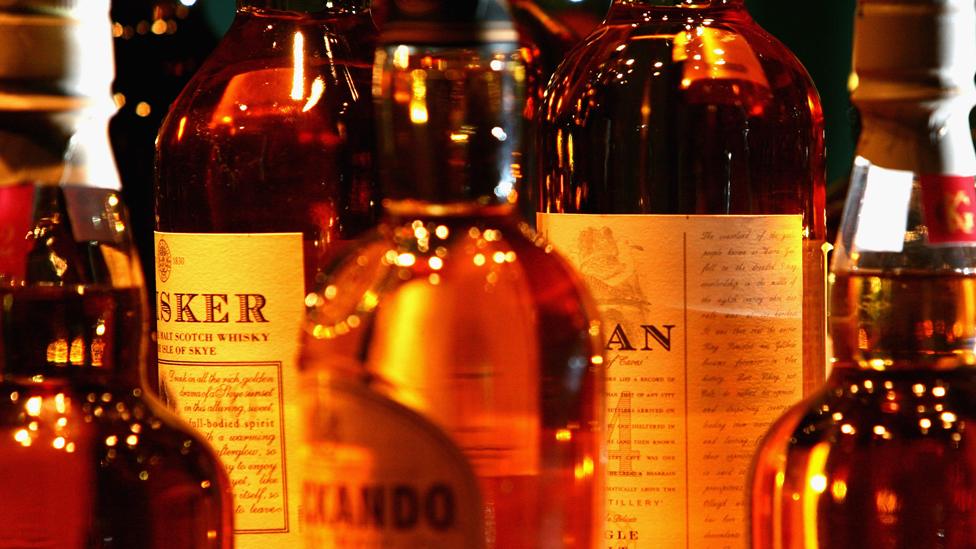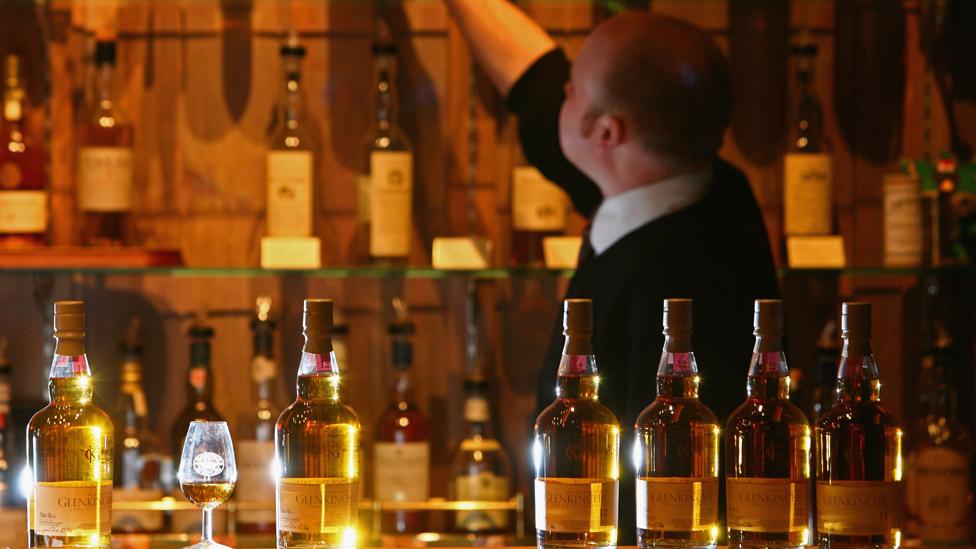Tit-for-tat trade
- Published

Scotch whisky has been harshly caught in the cross-fire of two disputes between the EU and USA, one about steel, the other about airliners. When the EU targeted bourbon, Scotch looked vulnerable to retaliation.
A rough reckoning of the cost could be a £66m drop in exports and £70m added cost in tariffs. But Scotch could prove resilient, if its American drinkers are willing to absorb higher prices, or if they switch to premium brands of blended Scotch.
However, this trade war isn't over, and blends being exported to the US, worth twice as much as single malts last year, could become the next victim.
Why pick Scotch? Isn't Donald Trump half Scottish, with a love for its golf courses, or at least the ones that belong to him?
The selection of premium end whisky from the president's late mother's homeland as retaliation for UK subsidies to Airbus may not have registered as one of the details crossing the Oval Office desk.
But it came as no surprise to the Scotch whisky industry. It saw the risk that came with the European Commission's choice, in 2017, of American whiskey in its retaliation in another trade dispute.
That one was about steel, with President Trump putting up trade barriers against Chinese imports of subsidised steel, and doing a lot of damage to trading relations with others by imposing import levies on them as well.
The European Commission chose iconic American products with which to retaliate, including tariffs on Harley Davidson motorbikes and 25% on imported bourbon.
In a game of tit-for-tat, which is a feature of such trade wars, Scotch looked vulnerable.
Absorbing cost
So how much will it suffer? A back of the envelope calculation suggests the fall in exports of Scotch to the US might come to around £66m.
That would leave sales of £270m, on which tariffs will be levied, bringing £68m into the American Treasury.
Who pays that? Some will likely be absorbed by the importer. In some cases of large multinational drinks companies, the exporter and importer is one and the same.

But over time, you can expect the American drinker of Scotch whisky to pick up that tab. In the end, the customer pays.
This calculation is based on some bold assumptions, but the Scotch Whisky Association has noted the effect of the European Union imposing that 25% tariff on the import of American whiskey.
EU imports of US whiskey were down around 20%. Karen Betts, chief executive of the SWA, reckons that is a benchmark for the likely impact on Scotch single malts.
So from around £330m of single malt sales last year - 33% of the total for Scotch whisky, including blends - you would see a 20% drop, to around £270m, on which the 25% is then levied.
Canny traders
However, there are some factors that could get to a different result. Scotch whisky may have a less elastic demand, particularly among the more affluent drinkers of single malt.
In other words, demand may not be that closely related to price. In some circumstances, albeit rare, whisky enthusiasts could even be persuaded that the higher price is a signal that the brand carries a higher value and status.
There's also the question of how much whisky has already been stockpiled, thus avoiding any tariff - at least, while stocks last. It's currently being imported into the US without any tariff, and that's the way it's been since 1994.

Canny traders will have noted that whisky was on the list of possible targets linked to the Airbus dispute, published in July by the US Trade Representative, and they could have bet on getting stocks in ahead of the September ruling.
But canny exporters will also have been busy stockpiling in other countries where Scotch exports could be hit by Brexit. That is partly to avoid any congestion at trading ports, but also some potential tariffs.
Without a deal, there was a risk that Scotch would lose out on the tariff-free arrangements hammered out by the European Commission with South Korea, Vietnam, Colombia and Morocco.
Reverting to WTO rules on trade would have brought tariffs back into effect on exports to those countries. However, the whisky industry sounds reassured that the UK government has signed deals to roll over the existing European Union free trade arrangements, temporarily, with almost all those governments involved. Only Morocco has yet to be concluded, and that is expected before long.
Ammunition
Yet another factor: substitutability. Will American drinkers of Scotch readily shift to alternatives from the Republic of Ireland, Canada, Japan or their own home-distilled liquor?
Maybe so, but the targeting of single malt means there is an opportunity for the larger distillers to shift their marketing on to Scotch blends. Thus, Diageo could push the more premium colours of Johnnie Walker label, and Pernod Ricard has an opportunity with Chivas Regal.
However, they should be careful. The split of single malts from blends, in the choice made by the US trade authority, was not expected by the distilling industry in Scotland.
And by not including blends in retaliation for the Airbus-Boeing dispute, the Americans have kept some ammunition in reserve for any escalation of the trade war.
There's another £670m-worth of whisky blend exports, on the basis of last year's trading figures, that could still be hit with tariffs.
This trade war is far from over. The European Commission awaits a WTO ruling on its complaints about subsidy to Boeing. That is likely in the middle of next year.
It suggests to the US that being allowed to retaliate by the WTO doesn't mean that Washington has to do so, because it must be aware that an equal and opposite response is likely.
It's easy, in such trade wars, to ratchet them up. It's much more difficult to negotiate them down - least of all for UK trade negotiators, who have no experience and a lot to do, in a hurry, after Brexit.
